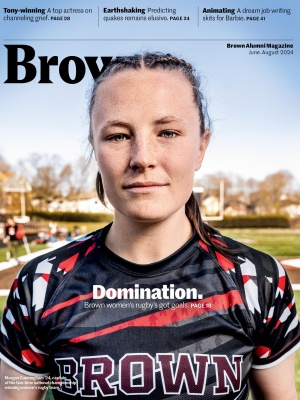Beyond Narnia
A popular course on C.S. Lewis is taught by a trio of deep-thinking MDs.

Walking into the first class of UNIV 0400: Beyond Narnia, infectious disease specialist Timothy Flanigan expected an empty classroom: “I thought, no students are gonna take this course. And no students are gonna take this course taught by a physician.” To his surprise, the room was packed with eager students—The Chronicles of Narnia fans plus others interested in Lewis’s philosophy and Christian apologetics.
Fifteen years later, Beyond Narnia has expanded to three sections, taught by Flanigan, an HIV expert; Edward Wing, another infectious disease expert and professor emeritus; and Hannah Wei Wu, a research pediatrician. Reading a novel each week, students submit quotes and thoughts to be read in class. Group activities include a session when, in place of a traditional lecture, they create and host a Jeopardy! style game and guided discussion.
Wu audited the course in 2018 and says it changed her in many ways. Not religious at the time, it was Lewis’s apologetics that appealed. “His influence on me was more about the reasoning because I’m such a scientist. I have to know the reason why. I have to have the logic.” Then, in final projects, Wu saw how her peers pushed the boundaries of their creative comfort zone by learning to translate the stories—writing songs, making movies, and creating picture books and board games based on the fictional land. Hearing their reflections, she realized they were also grappling with difficult questions and growing in understanding.
“I think seeing their lives and perspectives change also made my life change, my heart change,” she says. “Before the class, I’d been focused only on my research. My belief was that you have to use the time efficiently, so I didn’t talk to people much in the lab. But now, with such a group of very young, energetic students, I feel like they light up my heart. They make me feel more human and connected, and they share the joy of everything I am doing.” Wu took on teaching Beyond Narnia’s third section last year.
Prodigal son
An Anglican by birth, C.S. Lewis left the faith, dabbling in the occult and European mythos before returning to Christianity. That journey is part of what Flanigan believes makes Lewis’s literature, which incorporates Christian theology and themes, so accessible.
Lewis’s struggles with faith and loss feature most heavily in his nonfiction works The Problem of Pain and A Grief Observed, which students read after watching Shadowlands, a 1993 biopic on the relationship between Lewis and Joy Davidman. “When Joy Davidman passes away from cancer after their two-year marriage, that grief observed by C.S. Lewis really, really hits home for a lot of people,” Wing explains. The Problem of Pain, written before he knew Davidman, is “this intellectual, fascinating book where he’s trying to explain why bad things happen to good people. And then A Grief Observed is this outpouring of emotion. In that book he slowly changes and reconciles with God. So it’s a very intense, emotional set of books.”
One student in Wing’s section last spring, Melanie Kim ’23, remembers the impact Grief had on her: “I appreciated how real and vulnerable he was, especially since I had lost my grandma a few months before…I saw somebody else struggling with loss while figuring out how to navigate faith and see God differently.” She cites discussions with fellow students about loss or the afterlife as described in another Lewis book, The Great Divorce, as personal highlights of the course.
Qualifications optional
When he received the offer to coteach, Wing says, “What struck me is that Tim and I have no qualifications whatsoever to teach this course. We’re doctors, we teach medical students and residents.” However, he concedes, “We meet with life and death—but also all human issues—all the time in medicine. So we can relate stories easily in class and to the students.”
Wu finds her own research on parasitic disease allows her to connect with students more deeply. “The reason I went into the medical field was that I wanted to be helpful, to heal people or help people be healthy and happy. But reality tells us that sometimes you can’t.” Perhaps, she says, the Narnia professors are so good at connecting with students precisely because they admit they don’t have all the answers.
Flanigan encourages other Brown professors who are passionate about Lewis to join their ranks: “We would love other faculty from other disciplines to dip their foot in the water…they can coteach one of the weekly sessions with us.”
Madeline Wachsmuth ’25, who took Beyond Narnia last spring, found it refreshing that Flanigan was a bit of an academic outsider, frequently sharing his knowledge on science and medicine with the class: “I think it’s always important when a professor is sharing a part of their life with you,” she says, “because it changes from an impersonal teaching to ‘we’re both humans.’”
While the popularity of Beyond Narnia may have surprised him, Flanigan is a firm believer in the magic of reading Lewis, who “understands our humanness so well, and our difficulties—where we get stuck in, how we have to understand ourselves,” he says. Flanigan—who is a permanent deacon in the Catholic Diocese of Providence—also founded the Inklings Project with colleages at Notre Dame to support new courses and groups countrywide dedicated to the works of Lewis and his friend, J.R.R. Tolkien.





